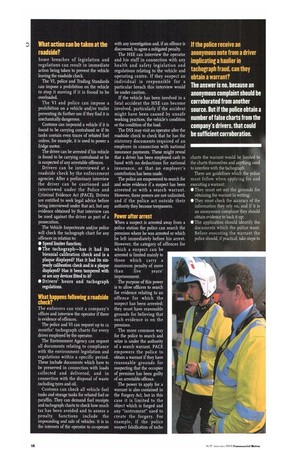What happens following a roadside check?
Page 18

If you've noticed an error in this article please click here to report it so we can fix it.
The enforcers can visit a company's offices and interview the operator if there is evidence of offences.
The police and VI can request up to 12 months' tachograph charts for every driver employed by the operator.
The Environment Agency can request all documents relating to compliance with the environment legislation and regulations within a specific period. These include documents which have to be preserved in connection with loads collected and delivered, and in connection with the disposal of waste including tyres and oil.
Customs can check all vehicle fuel tanks and storage tanks for rebated fuel or paraffin. They can demand fuel receipts and tachograph charts to check how much tax has been avoided and to assess a penalty. Sanctions include the impounding and sale of vehicles. It is in the interests of the operator to co-operate with any investigation and, if an offence is discovered, to agree a mitigated penalty.
The HSE can interview the operator and his staff in connection with any health and safety legislation and regulations relating to the vehicle and operating centre. If they suspect an individual is responsible for a particular breach this interview would be under caution.
If the vehicle has been involved in a fatal accident the HSE can become involved, particularly if the accident might have been caused by unsafe working practices, the vehicle's condition or the condition of the load.
The DSS may visit an operator after the roadside check to check that he has the statutory documents required of an employer in connection with national insurance payments. These might reveal that a driver has been employed cash in hand with no deductions for national insurance, or that no employer's contribution has been made.
The police are empowered to search for and seize evidence if a suspect has been arrested or with a search warrant. However, these powers are not unlimited, and if the police act outside their authority they become trespassers.
































































































